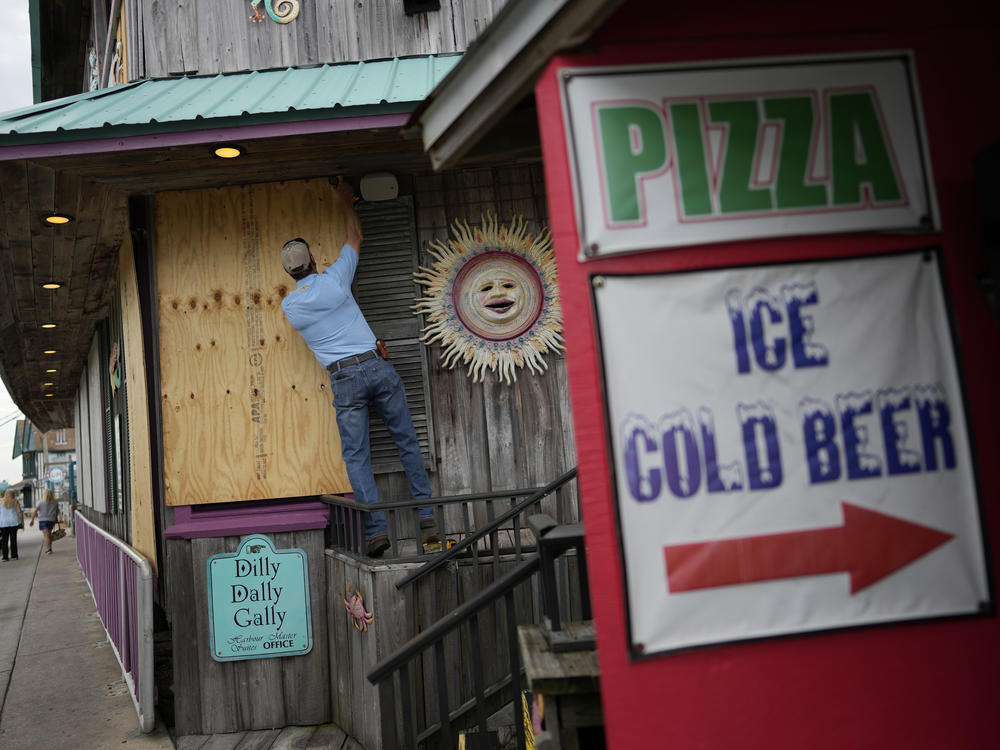Section Branding
Header Content
Florida rushes to make its final preparations before Hurricane Idalia makes landfall
Primary Content
Florida officials are urging residents along the Gulf Coast to finish making their storm preparations on Tuesday before Hurricane Idalia makes landfall in the state Wednesday morning.
The storm was upgraded from a tropical storm to a hurricane early Tuesday, and forecasters say Idalia could be a fierce Category 3 storm by the time it comes ashore in the continental U.S., bringing destructive winds and life-threatening storm surge to some areas.
"You still have time this morning to be able to make your final preparations if you are in one of those areas that's in line for the major storm surge and you're told to evacuate," Gov. Ron DeSantis said in a Tuesday morning press conference.
"You have time to do that, but you gotta do that now," he emphasized.
As of Tuesday morning, Idalia was about 120 miles away from Dry Tortugas with maximum sustained winds of 85 miles per hour, according to the National Hurricane Center. Storm surge and hurricane warnings were in effect for areas along Florida's western coast.
More than a third of Florida counties are under either mandatory or voluntary evacuation orders, and the state was marshaling resources to be able to restore power in the case of outages and conduct rescue operations if needed. DeSantis has also deployed 5,500 members of the National Guard.
The White House said President Biden and DeSantis spoke on Monday about storm preparations and that Biden had approved an emergency declaration for Florida.
Forecasters expect the eye of Idalia to chart a course toward Florida's Big Bend, the region where the peninsula meets the panhandle. According to forecasters, no major hurricanes have tracked into the region's Apalachee Bay since 1851.
The National Weather Service said the area could see life-threatening winds, with the possibility of structural damage to buildings and even the complete destruction of mobile homes.
"Damage will be greatly accentuated by large airborne projectiles. Locations may be uninhabitable for several weeks or months," the forecast warned.
Forecasters noted that even if people are located outside of Idalia's direct path, they could still feel the impacts of the storm.
The NWS expects storm surge — which occurs when strong winds heave seawater onto land in coastal areas — to cause "widespread deep inundation" that could wash out escape routes and render certain areas unfit to live for a time.
Storm surge is predicted to be as high as 15 feet in some parts of the Big Bend and as high as 7 feet in Tampa Bay.
As much as a foot of rainfall is also expected near where the storm comes ashore in Florida, with lower rainfall totals predicted for other parts of the state, as well as Georgia and the Carolinas. Tornadoes in those states are also possible.
Idalia battered the westernmost tip of Cuba with up to 4 inches of rain, the Associated Press reported.
DeSantis said evacuees don't necessarily need to travel long distances — people can go tens of miles inland to a shelter, hotel or the home of family or friends to escape storm surge conditions near the coast.
Florida's emergency management chief, Kevin Guthrie, also urged people who are forced to evacuate to bring comfort items for their children, such as their favorite toys or snacks, and not to leave pets behind.
Copyright 2023 NPR. To see more, visit https://www.npr.org.

